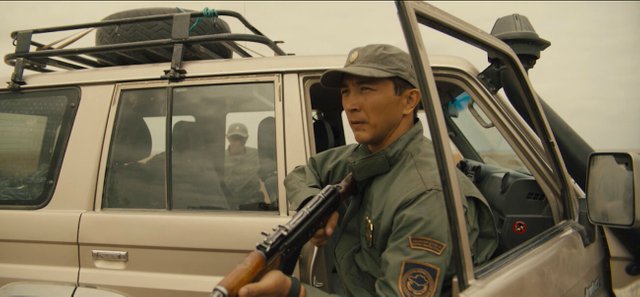How a Movie About Poachers from Kazakhstan Defines the “Modern Western”

After the showing of STEPPE, a feature film we selected for our recent Tombstone Film Festival, an audience member approached me and stated, “That was a great movie but I still don’t see how it is a Western.” This is a common reaction from both fans of the genres and outsiders who place the Western in a tiny little box, always thinking of John Wayne movies, the Eastwood Spaghettis, and the iconic TOMBSTONE as definitive examples of the genre. But the Western is so much more and it doesn’t belong only to America.
I answered the lady’s question with a series of points. STEPPE is an action thriller set in the desert wilderness of Kazakhstan. “It’s set on the frontier,” I told her, “as much of a frontier setting as the American West.” The movie focuses on the fight between game wardens and poachers. “You have outlaws and lawmen. Yes, they wear modern uniforms but they’re outlaws and lawmen all the same.” Common to the Western genre, there are shoot-outs in Maxim Akbarov’s movie, plenty of them. Yes, these involve AK-47s and other modern weapons but if you staged the exact same situations (a raid on a remote house, a chase through the desert) in a 19th century setting, no one would question whether it was “Western” or not. “There are even horses,” I continued. The characters end up having to travel on horseback and part of the climactic fight, which I won’t spoil, involves a horse. “But most of all,” I concluded, “it’s about moral codes, the conflict between different moral codes. And that’s what really makes a movie a Western.” I have long argued that there are plenty of films with cowboys and gunfights that aren’t truly Westerns because they lack a thematic core. Along those lines, I’d debate that STEPPE is more of a Western than some of those superficial entries in the genre. Its characters, both heroes and villains, have a code they live by and the central action of the story concerns the way those codes conflict with each other. And like all great Westerns, it touches on the coming of civilization to the wild, the fight for a civilized life against an untamed world.
We selected more international Westerns this year to our Tombstone Film Festival than American ones. That is no slight to domestic efforts in the genre. We were simply overwhelmed with excellent entries from Spain, Switzerland, France, Canada, Sweden, and as mentioned even one from Kazakhstan. Often over-simplified and misunderstood, the Western is one of the most complex, varied genres in the history of cinema. And seeing the wealth of stories that continue and expand upon its traditions, defying time periods and borders, I think it is as alive and well today as it has ever been.
P.S. STEPPE currently has no American distribution. That needs to change.
This article will be posted next week on my website runningwildfilms.com and my Facebook page, Travis Mills Filmmaker. For now, it is only available on steemit